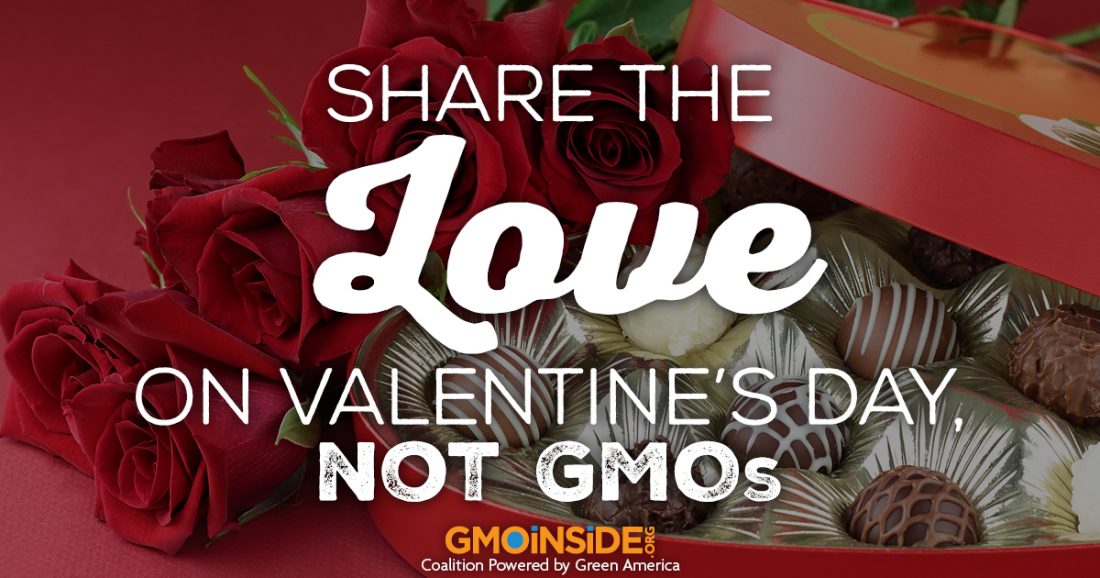
Valentine’s Day often involves getting treats for a sweetie, but sometimes those sweets come with hidden ingredients—genetically modified organisms (GMOs). Most of America’s favorite Valentine’s Day sweets are chockfull of ingredients that are highly likely to be genetically engineered-- such as sugar, soy lecithin, corn starch, and corn syrup and partially hydrogenated soybean oil. GMOs have never been proven safe for consumption. GMOs are designed to work hand-in-hand with pesticides, and a growing body of studies expose the health effects of exposure to and consumption of these toxic chemicals. In fact, about 55 percent of U.S. sugar is produced from GM (genetically modified) sugar beets, and almost 100% of U.S. sugar beets have been modified to tolerate the herbicide glyphosate, the active ingredient in Monsanto’s Roundup. This means that liberal amounts of Roundup can be applied to GM sugar beets without killing the crop, which leads to greater amounts of these chemicals in our environment—and our food. Luckily, things are starting to change. Hershey Co. decided earlier this year to stop buying beet sugar because it comes from GM sugar beets. In response to tens of thousands of Facebook posts, emails, and telephone calls from consumers who took part in GMO Inside’s campaign calling on Hershey’s to move to non-GMO ingredients, the U.S. chocolate giant confirmed that as part of its commitment to simpler ingredients, its milk chocolate bar and Hershey’s kisses transitioned to non-GMO ingredients at the end of 2015. As a large company with massive purchasing power, Hershey’s has the ability to move the non-GMO supply chain forward, breaking down barriers for other companies to gain access to non-GMO ingredients. Until candy companies break up with GMOs there are dozens of producers that offer organic and non-GMO sweets you and your valentine will love. Here’s How to Break Up with GMOs on Valentine’s Day: Unless your Valentine’s Day sweets are certified organic or non-GMO verified it is highly likely that they contain GMO ingredients. Non-GMO verification ensures a product does not contain GMOs and organic certification means a product was produced without synthetic additives like pesticides, chemical fertilizers, and dyes, and must not be processed using industrial solvents, irradiation, or genetic engineering (GMOs). Choose organic chocolate or non-GMO verified treats to show your loved ones you really care. For an even sweeter treat, look for fair trade products that ensure workers are treated fairly. Green America’s Chocolate Scorecard can help you find whatever your heart fancies, when it comes to non-GMO and fair trade sweets. To learn even more, check out Mamavation’s article about what’s really inside popular Valentine’s chocolates. This Valentine’s Day say no to GMOs, and show someone that you care for them by giving them quality chocolate and candy without GMOs or artificial ingredients. From all of us at GMO Inside and Green America, Happy Valentine’s Day! We need your support to continue our work against GMOs Sign Up to get more informed about GMOs in our food supply ABOUT GMO INSIDE AND GREEN AMERICA GMO Inside is a campaign dedicated to helping all Americans know which foods have GMOs inside, and the non-GMO verified and organic certified alternatives to genetically engineered foods. We believe that everyone has a right to know what’s in their food and to choose foods that are proven safe for themselves, their families, and the environment. Green America is the nation’s leading green economy organization. Founded in 1982, Green America (formerly Co-op America) provides the economic strategies, organizing power and practical tools for businesses, investors, and individuals to solve today’s social and environmental problems (http://www.greenamerica.org/).


